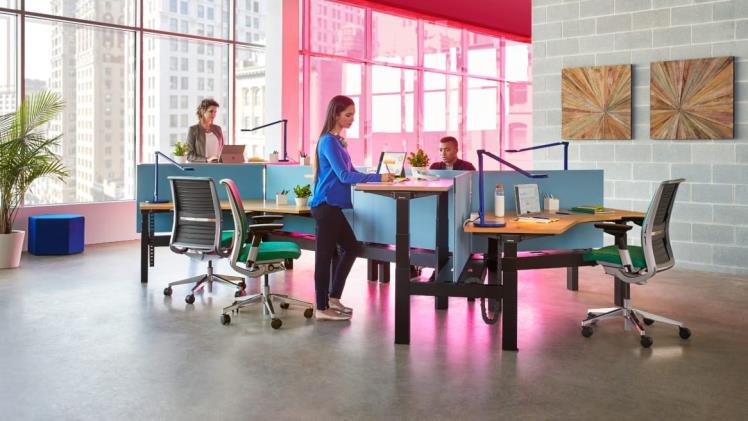Late night work sessions have become a common occurrence for many individuals. Whether you’re burning the midnight oil to meet a deadline or catching up on tasks after a busy day, working late into the night can take a toll on your health and well being. However, with the introduction of standing desk , late night workers now have a powerful tool to combat the negative effects of prolonged sitting and maintain their productivity and health.
While the allure of burning the midnight oil may be strong, it’s essential to prioritise your health and well being during these extended work hours. Standing desks offer a versatile and effective solution for late night workers looking to maintain their performance and vitality throughout the night.
The Perils of Prolonged Sitting:-
Late night work sessions often involve hours of uninterrupted sitting, which can have detrimental effects on both physical and mental health. Studies have linked prolonged sitting to a host of health issues, including obesity, cardiovascular disease, and musculoskeletal disorders. Additionally, sitting for extended periods can lead to feelings of fatigue, decreased concentration, and diminished productivity, making it challenging to stay focused and alert during late-night work sessions.
Enter the Standing Desk:-
Standing desks, also known as stand up desks or sit stand desks, offer a solution to the pitfalls of prolonged sitting by allowing users to alternate between sitting and standing throughout the workday. These adjustable desks can be easily raised to a standing height, allowing late-night workers to break up long periods of sitting and stay active and engaged during their work sessions.
Benefits for Late Night Workers:-
1. ncreased Energy and Alertness:-
Standing while working can help combat feelings of fatigue and drowsiness often experienced during late night sessions. By promoting better circulation and blood flow, standing desks can boost energy levels and improve cognitive function, helping you stay sharp and focused on your tasks.
2. Improved Posture and Comfort:-
Prolonged sitting can lead to poor posture and discomfort, especially during late-night work sessions when fatigue sets in. Standing desks encourage better alignment of the spine and support a more ergonomic working posture, reducing strain on the neck, shoulders, and lower back.
3. Enhanced Productivity:-
Research has shown that standing while working can lead to increased productivity and efficiency. By keeping the body in an upright position, standing desks can promote better engagement and concentration, allowing late-night workers to tackle tasks with renewed focus and clarity.
4. Better Overall Health:-
Using a standing desk can have long term benefits for late night workers’ health and well-being. By reducing sedentary behaviour and promoting movement throughout the workday, standing desks can lower the risk of obesity, heart disease, and other chronic health conditions associated with prolonged sitting.
5. Dynamic Movement:-
Standing desks encourage dynamic movement and flexibility, allowing late-night workers to shift positions and stretch their muscles while tackling tasks. Incorporating gentle movements like swaying, toe taps, or calf raises can help improve circulation and alleviate stiffness during prolonged work sessions.
6. Mindful Ergonomics:-
Ergonomic considerations are crucial for optimising comfort and productivity during late-night work. Ensure that your workstation is set up ergonomically, with the monitor at eye level, keyboard and mouse within reach, and proper support for your wrists and forearms to prevent strain and discomfort.
7. Lighting and Environment:-
Creating a conducive work environment is essential for late-night productivity and well-being. Dimming overhead lights and using task lighting can help reduce eye strain and promote relaxation, while maintaining a comfortable room temperature and minimising distractions can enhance focus and concentration.
8.The Psychological Impact:-
1. Mood Enhancement:-
Standing desks have been shown to have a positive impact on mood and overall well-being, thanks to the release of endorphins and neurotransmitters associated with movement and physical activity. Late-night workers may find that standing while working helps combat feelings of stress, anxiety, and overwhelm, leading to a more positive and productive work experience.
2. Creativity and Innovation:-
Research suggests that physical activity and changes in posture can stimulate creativity and problem-solving abilities. Late-night workers may discover that standing while brainstorming or tackling challenging tasks sparks new ideas and insights, fostering innovation and ingenuity in their work.
Practical Tips for Late Night Work Success:-
1. Establish a Routine:-
Set a consistent schedule for late night work sessions to optimise productivity and ensure adequate rest and recovery. Designate specific times for work, breaks, and sleep, and stick to your routine as much as possible to maintain a healthy work-life balance.
2.Stay Hydrated and Nourished:-
Fuel your late night work sessions with healthy snacks and plenty of water to sustain energy levels and focus. Avoid sugary or caffeinated beverages, which can lead to energy crashes and disrupt sleep patterns.
3.Prioritise Self Care:-
Take regular breaks to rest and recharge during late-night work sessions, engaging in activities that promote relaxation and stress relief. Whether it’s a quick walk around the block, a few minutes of meditation, or a brief stretch break, prioritise self care to support your overall well being.
Conclusion:-
Standing desks offer a multifaceted approach to optimising late-night work performance and well being. By promoting movement, flexibility, and mindfulness, standing desks empower late-night workers to maintain productivity and vitality throughout extended work sessions while prioritising their physical and mental health. Whether you’re burning the midnight oil for a deadline or pursuing a passion project into the wee hours, integrating a standing desk into your late night work routine could be the key to unlocking a healthier, more balanced approach to work and life.

